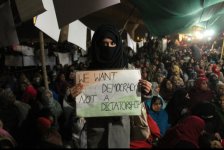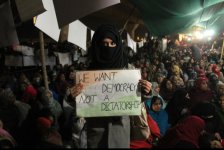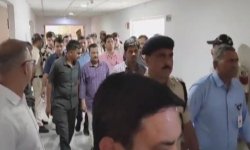India—the land of a thousand voices, a thousand ideologies is silently transforming. Once celebrated for its robust multi-party democracy, it now increasingly resembles a political arena dominated by one colour, one voice, and one face. The idea of “choice” in Indian elections is beginning to feel like a grand illusion. Many now ask: "Is Indian democracy under threat, or merely wearing the mask of democracy?"

Since 2014, the Bharatiya Janata Party (BJP) has risen to unprecedented political heights. The BJP’s electoral victories, communication machinery, and emotional nationalism—hinged on religion, military pride, and gharwa ashrams—have undeniably reshaped Indian politics. But behind this glossy narrative lies growing concern: political dominance, not healthy competition. Opposition parties aren’t just losing—they’re being systematically dismantled.
Be it the disqualification of Congress leader Rahul Gandhi, ED raids used as tools of political vendetta, or the relentless targeting of opposition through the political misuse of investigative agencies in India, there's unmistakable unease. A revealing report noted that out of 121 people investigated by ED since 2014, 115 were from Opposition parties—a staggering indication of bias .

When BJP leaders face controversy, media outrage vanishes. In the infamous Lakhimpur Kheri massacre, where protesting farmers were allegedly run over—captured chillingly in videos—the vehicles were tied to Union Minister Ajay Mishra Teni’s family. Despite the horror, there were no resignations, very little accountability, and minimal media continuity .

Contrast that with Arvind Kejriwal's arrest in the Delhi liquor policy case, plastered across headlines despite no proven corruption. That looked more like a political witch hunt in India than a legal investigation.

In Jharkhand, Hemant Soren was arrested on land scam allegations just before the elections. Meanwhile, BJP’s Yediyurappa, previously embroiled in corruption, saw no similar agencies knocking on his door. And Abhishek Banerjee, despite media trials over a coal smuggling case, remains free without convictions .
This selective outrage is amplified by mainstream “Godi Media”, whose primetime debates are less about journalism and more about performing for the ruling party. The freedom of press in India is under siege, real governance issues are buried, while opposition jibes become national controversies .

The BJP excels in emotional politics. Criticize them, and you risk being labeled anti‑national. Demand accountability, and you're branded traitorous. This is not democracy, it’s psychological conditioning that manipulates voters emotionally, not rationally.
Opposition parties are far from perfect—the Congress is fractured, and regional outfits lack unity. But does that justify unleashing the CBI and ED before every election cycle? Should dissent be criminalized?

A true democracy demands a vigilant press, an independent judiciary, a vibrant opposition, and neutral institutions. Today, all these pillars are teetering. Elections happen, but if the discourse is manipulated, institutions biased, and choices constrained, can we still call it democracy?
This isn’t just political commentary—it’s a warning. When one party controls the narrative, institutions, and public sentiment—democracy doesn’t vanish with violence, it erodes in silence. With ballots in hand, but eyes blindfolded, one-party dominance isn’t a risk, it’s reality.

Since 2014, the Bharatiya Janata Party (BJP) has risen to unprecedented political heights. The BJP’s electoral victories, communication machinery, and emotional nationalism—hinged on religion, military pride, and gharwa ashrams—have undeniably reshaped Indian politics. But behind this glossy narrative lies growing concern: political dominance, not healthy competition. Opposition parties aren’t just losing—they’re being systematically dismantled.
Be it the disqualification of Congress leader Rahul Gandhi, ED raids used as tools of political vendetta, or the relentless targeting of opposition through the political misuse of investigative agencies in India, there's unmistakable unease. A revealing report noted that out of 121 people investigated by ED since 2014, 115 were from Opposition parties—a staggering indication of bias .
When BJP leaders face controversy, media outrage vanishes. In the infamous Lakhimpur Kheri massacre, where protesting farmers were allegedly run over—captured chillingly in videos—the vehicles were tied to Union Minister Ajay Mishra Teni’s family. Despite the horror, there were no resignations, very little accountability, and minimal media continuity .
Contrast that with Arvind Kejriwal's arrest in the Delhi liquor policy case, plastered across headlines despite no proven corruption. That looked more like a political witch hunt in India than a legal investigation.
In Jharkhand, Hemant Soren was arrested on land scam allegations just before the elections. Meanwhile, BJP’s Yediyurappa, previously embroiled in corruption, saw no similar agencies knocking on his door. And Abhishek Banerjee, despite media trials over a coal smuggling case, remains free without convictions .
This selective outrage is amplified by mainstream “Godi Media”, whose primetime debates are less about journalism and more about performing for the ruling party. The freedom of press in India is under siege, real governance issues are buried, while opposition jibes become national controversies .
The BJP excels in emotional politics. Criticize them, and you risk being labeled anti‑national. Demand accountability, and you're branded traitorous. This is not democracy, it’s psychological conditioning that manipulates voters emotionally, not rationally.
Opposition parties are far from perfect—the Congress is fractured, and regional outfits lack unity. But does that justify unleashing the CBI and ED before every election cycle? Should dissent be criminalized?
A true democracy demands a vigilant press, an independent judiciary, a vibrant opposition, and neutral institutions. Today, all these pillars are teetering. Elections happen, but if the discourse is manipulated, institutions biased, and choices constrained, can we still call it democracy?
This isn’t just political commentary—it’s a warning. When one party controls the narrative, institutions, and public sentiment—democracy doesn’t vanish with violence, it erodes in silence. With ballots in hand, but eyes blindfolded, one-party dominance isn’t a risk, it’s reality.



